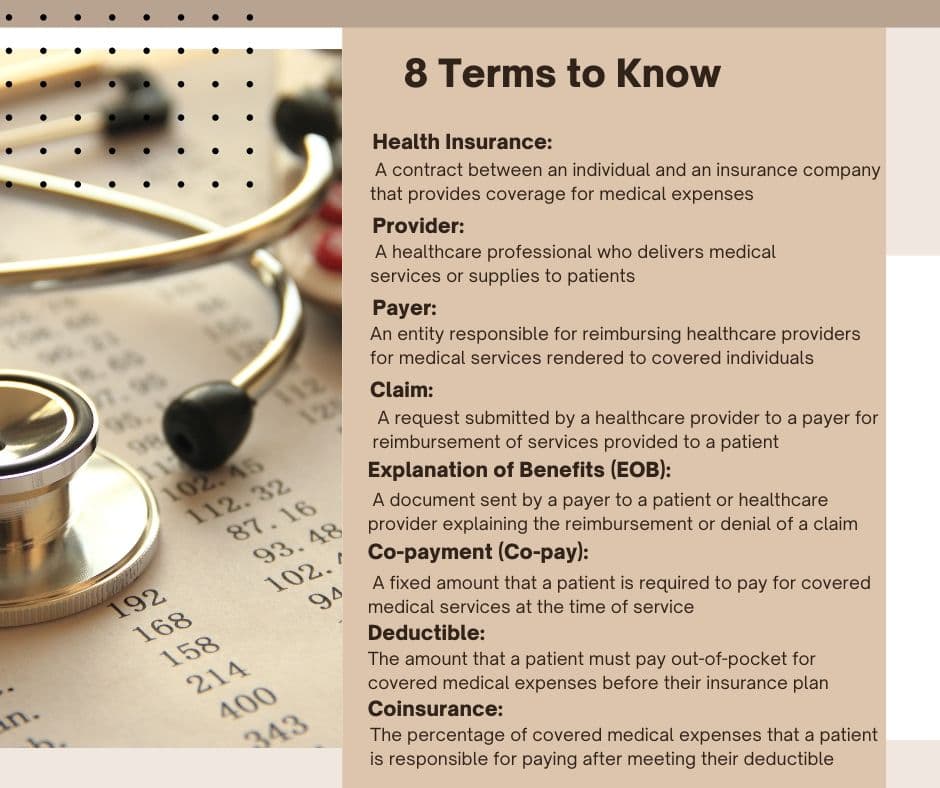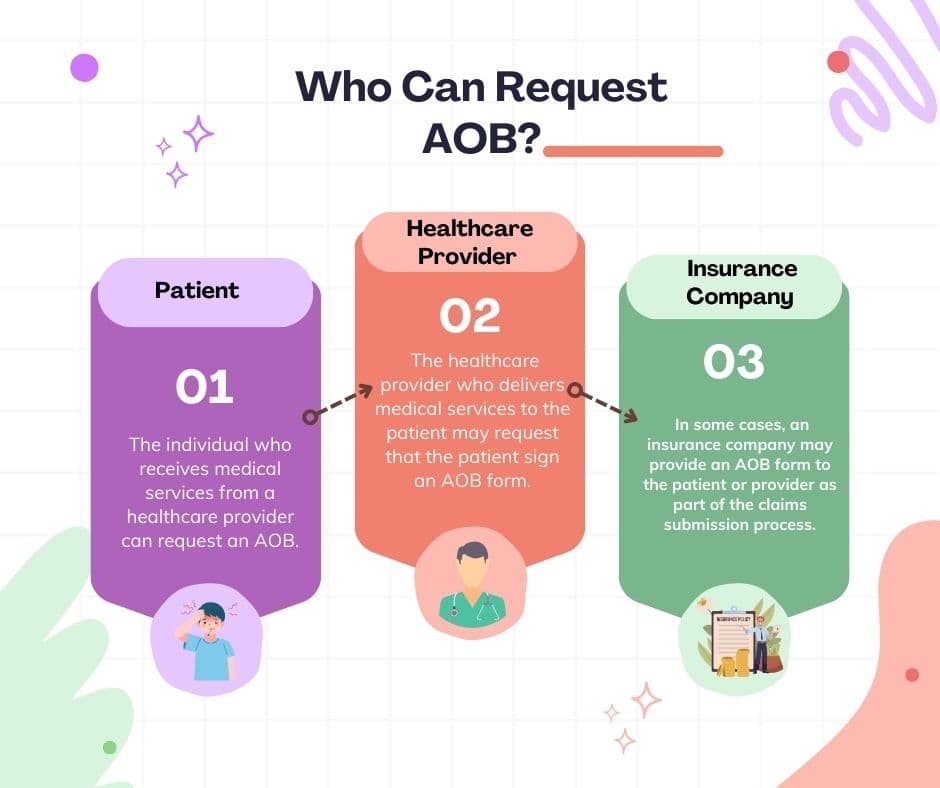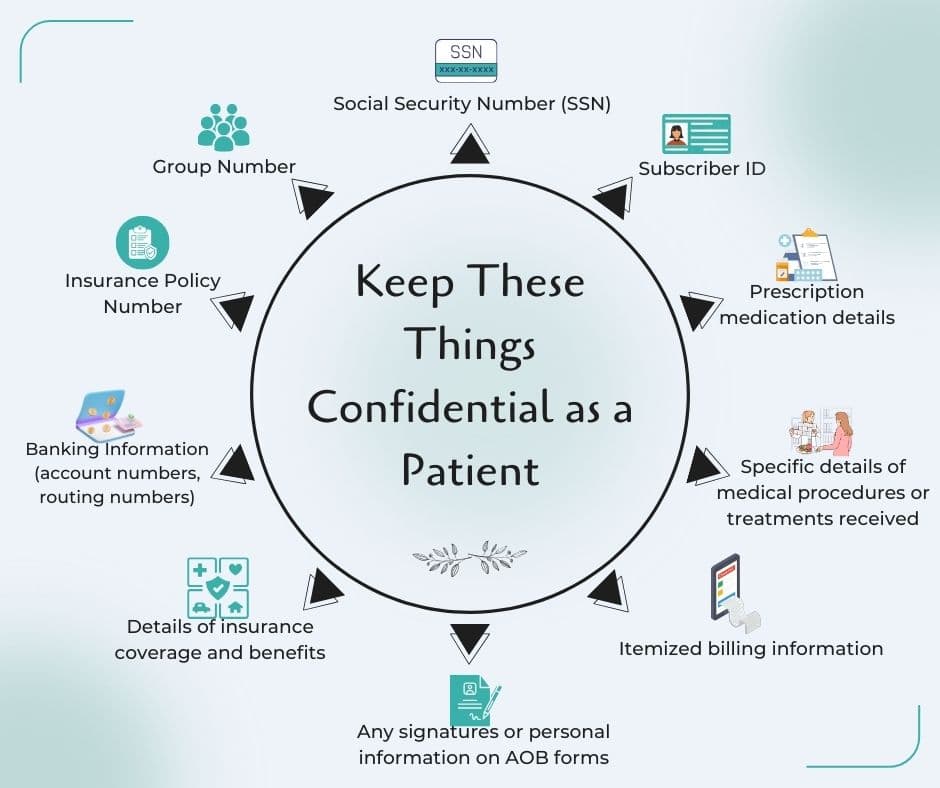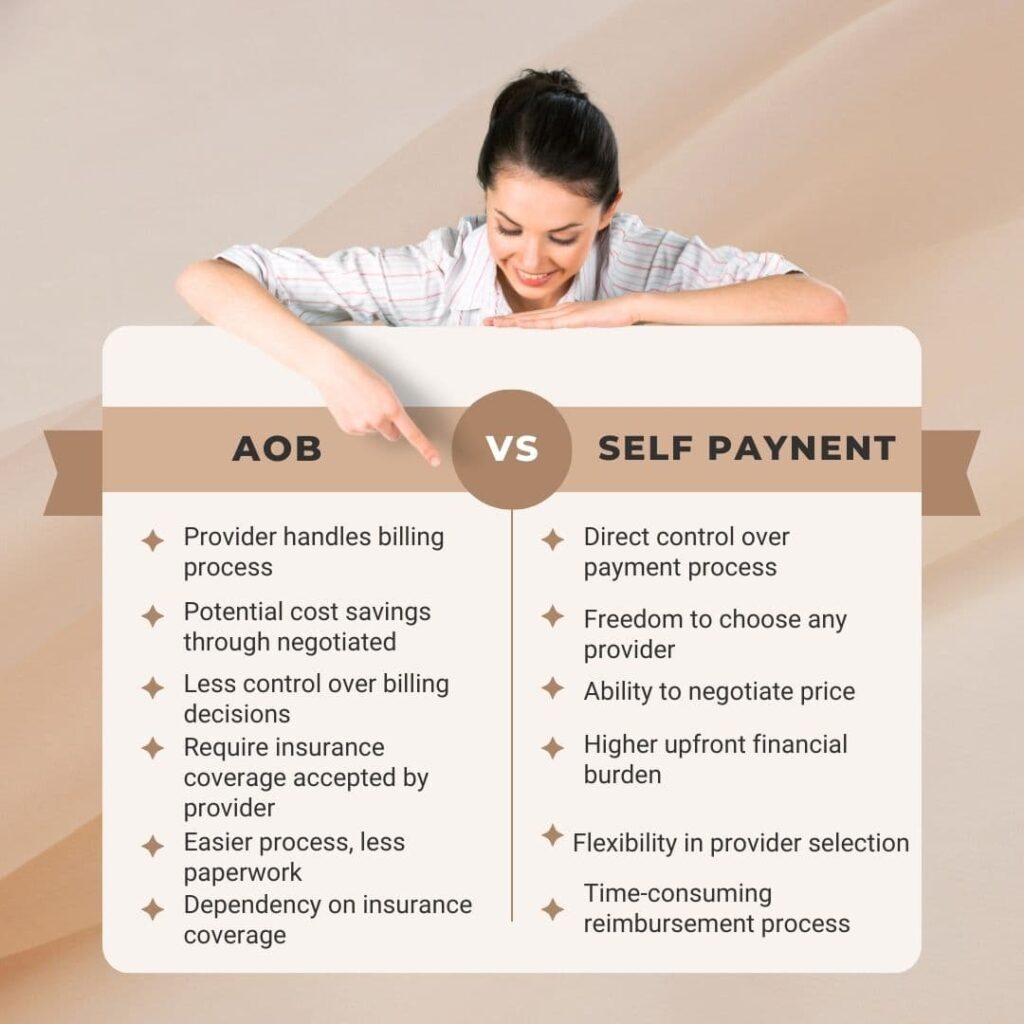Everyone wants to get insured for possible medical treatments in the future. But when it comes to billing, people face huge difficulty in paying expensive hospital bills. Even when you have insurance coverage, there is a small amount that you owe to the hospital, that appears not so small at all. Additionally, you wouldn’t want to stress yourself up when you have finished taking medical treatment. So you might opt for AOB in medical billing.
But if you are confused about whether to go for it or not, today, you’ll know the answers to all questions you might have related to AOB contract.
Understanding AOB in Medical Billing
AOB stands for “Assignment of Benefits”. AOB in medical billing is a contract between healthcare provider and patient, signed by the patient and sent to the insurance payers.
After signing this document, the patient transfers all claim rights to the healthcare providers and they are out of the process.
Now it is only the healthcare provider and insurance payer in the operation. The hospital communicates directly to the insurance payer and gets the payment.
As the name indicates, it is the allocation of benefits from the patient to the healthcare provider. In this process, patients contract with a reliable person within the healthcare facility where they have received the medical services.
Then, that person on behalf of the patient deals with the insurance payer and gets the reimbursement payment.
How Does It Work?
Let us tell you the process in simple words. Imagine you are getting your house roof repaired.
When the contractor asks for the payment, you sign an AOB document after which the contractor will contact your insurance company and ask for the repair payment to them. You are completely out of the picture.
Similarly, in healthcare, when you sign an AOB in medical billing, you are free to pay your bills, get medical service, go home, and take rest. Your insurance company will pay for your service and you are required to do nothing.
Following are some common AOB use cases:
| Scenario Description | Appropriate Use of AOB |
| Emergency Medical Care | When immediate treatment is needed and insurance coverage is available. |
| Chronic Condition Management | Ongoing medical care requiring frequent visits and services. |
| Specialist Consultations | Expert medical opinions or treatments requiring insurance coverage. |
| Diagnostic Testing or Imaging | Medical tests or procedures necessary for diagnosis or monitoring. |
| Long-Term Care or Rehabilitation | Extended medical services or therapies covered by insurance. |
Here is the process we have summed up in 5 points:
- After taking the medical service, you and your healthcare partner or contractor agree to signup AOB in medical billing
- The contract is signed. Paperwork is done
- The contractor then sends the AOB to the insurance company which reviews the document and makes any concerns clear
- The settlement check is made that contains the name of the contractor (or an agreed-upon individual) as specified.
- After all the information is verified, the insurance payer will issue the check and the process is marked as complete.
Faq’s About AOB

Even after understanding the definition and purpose of AOB in medical billing, there may be more questions running through your head. Like isn’t that similar to a normal insurance agreement? What if I change my mind and cancel the contract? And so on.
Have a look at these questions. I am sure you will find all your answers after reading that.
1. How Does It Differ From The Normal Billing Process?
In contrast to the standard billing procedure, AOB transfers payment responsibility from you to the healthcare provider.
By direct billing and receiving payment from the insurance provider using an AOB, the provider minimizes your involvement in handling medical bills.
2. When Should I Use AOB In Medical Billing?
If you want to give your healthcare provider permission to bill your insurance company directly and receive payments on your behalf, you can use an Assignment of Benefits (AOB).
It is frequently used by patients who want to simplify the billing procedure, lower their financial obligation, and guarantee that insurance benefits are utilized properly.
By using an AOB in medical billing, you give the healthcare provider control over billing and payment arrangements, which is convenient and might reduce out-of-pocket costs.
3. What Services I Can Use AOB For?
- Ambulance services
- Ambulatory surgical centers
- biological(s) and drugs
- Clinical diagnostic lab services
- Dialysis at-home equipment and supplies
- Can be used by those patients that have Medicaid and Medicare plans
- Professionals include clinical nurse specialists, certified nurse anesthetists, clinical social workers, clinical psychologists, nurse practitioners, physician assistants, and nurse midwives to deliver their services.
- Vaccinations like influenza
4. What Information Is Included In The AOB Document?
- Patient Information: The patient’s entire name, address, phone number, and insurance policy number.
- Healthcare Provider Information: Name, address, and phone number of the facility or healthcare provider providing the services.
- Insurance Company Details: The name of the patient’s insurance provider, the policy number, and any other pertinent insurance details.
- Assignment Authorization: The patient’s permission for the healthcare professional to bill the insurance company directly for services rendered will be expressly stated in the paperwork.
- Payment Assignment: Statement that the patient authorizes the insurance company to pay the healthcare facility or provider directly.
- Effective Dates: The start and end dates of the assignment, together with the duration for which the authorization is valid.
- Signatures: The patient’s signature and, in some situations, that of the healthcare professional or another designated representative is required on the document.
- Terms and Conditions: Specific terms and conditions about billing, reimbursement, confidentiality, and any other relevant information may be included in the AOB.
5. What If I Have To Cancel The Contract?
If you need to terminate the Assignment of Benefits (AOB) contract, you must do so by the steps laid out in the contract. The procedures you must follow to revoke or terminate the AOB in medical billing will often be outlined in the contract.
It can entail giving written notice of your desire to terminate the contract to the healthcare provider and the insurance provider, together with the cancellation’s effective date.
It’s crucial to analyze the AOB contract’s terms and conditions regarding cancellation or revocation to comprehend any potential implications or repercussions.
It is essential to abide by any cancellation requirements included in contracts because some may have strict deadlines or requirements.
6. What Are The Pros And Cons Of Signing An AOB?
Every AOB contract has different terms, so the consequences may vary. Here are the common pros and cons of opting for AOB in medical billing:
Pros:
- After signing the contract you don’t need to pay a single penny upfront.
- Many people love the idea of not getting into a clash during negotiations with the insurance payer.
Cons:
- If your insurance payer refuses to pay for you or they don’t know about such a contract, it could create huge trouble
- Some healthcare providers make it mandatory to sign up AOB in medical billing. This could restrict your selection of diverse healthcare facilities that don’t require AOB
- There are also some privacy concerns associated with the contract, as it involves the transfer of your insurance and healthcare details. Though all stakeholders are obliged to respect your privacy, there is always some risk.

7. How Does An AOB Affect My Medical Billing?
Your medical billing may be impacted by an Assignment of Benefits (AOB), which permits your healthcare provider to charge your insurance company directly for services delivered.
The requirement for upfront payment and reimbursement is removed. Direct payments to your provider will be made by the insurance company after processing the claims.
Your financial obligation may therefore be limited to coinsurance, deductibles, or copayments.
| Patient Concern or Consideration | Impact of AOB on Patient’s Billing |
| Financial Responsibility | Patients may have reduced out-of-pocket expenses due to direct insurance payments facilitated by AOB. |
| Billing Transparency | AOB agreements may lead to greater transparency in billing processes, as patients can track insurance claims and payments. |
| Coordination of Benefits | Patients need to ensure coordination between AOB agreements and other insurance coverage to avoid overpayment or billing discrepancies. |
| Impact on Out-of-Network Providers | Patients may face challenges when seeking care from out-of-network providers, as AOB agreements typically apply to in-network providers. |
| Billing Disputes and Resolution | Patients may encounter billing disputes or errors, requiring proactive communication with healthcare providers and insurers for resolution. |
| Medical Services Coverage | AOB agreements may limit patients’ choices of healthcare providers and services covered under insurance, impacting access to care. |
| Financial Assistance Options | Patients may face limitations in accessing financial assistance programs or charity care due to direct insurance payments facilitated by AOB. |
| Impact on Credit and Financial Standing | AOB agreements may impact patients’ credit and financial standing if billing disputes or non-payment issues arise, leading to potential collection actions. |
8. Will Signing An AOB Impact My Out-Of-Pocket Expenses?
Your out-of-pocket costs may change if you sign an AOB in medical billing. Your healthcare provider will submit a direct claim to your insurance carrier via an AOB.
Your financial obligation may therefore be limited to the deductibles, copayments, or coinsurance that your insurance plan specifies.
To ascertain how the AOB will particularly affect your out-of-pocket costs, it is crucial to analyze its provisions and comprehend your insurance coverage.
9. How Does An AOB Impact My Relationship With My Insurance Company?
By transferring the communication and payment process to your healthcare provider, signing an Assignment of Benefits might influence your relationship with your insurance provider.
The insurance company will pay the provider directly as specified in the AOB. They will serve as the primary point of contact for billing and claims.
10. Can I Choose Whether Or Not To Sign An AOB?
Yes, you typically have the option to sign an AOB in medical billing or not. You have the option to permit your healthcare practitioner to contact your insurance company directly; it is not required.
It’s crucial to weigh the potential advantages and disadvantages of signing an AOB and comprehend how it may impact your medical billing procedure and financial obligations.
Dive Deeper into AOB Basics
11. What Happens If I Don’t Sign An AOB?
Your healthcare provider won’t be able to bill your insurance carrier directly if you decide not to sign AOB in medical billing.
Instead, you will be in charge of covering the medical costs upfront before submitting a claim for reimbursement to your insurance provider by the terms of your policy.
Without an AOB, you will have more control over the billing procedure but will also be responsible for handling claim submission and insurance company communication.
It’s crucial to speak with your doctor and insurance provider to fully grasp the implications and available options if you choose not to sign an AOB.
12. How Can I Ensure That My Insurance Company Receives My Medical Bills Through The AOB Process?
You should confirm that your healthcare provider accepts AOB in medical billing and has the necessary information to start the process if you want to make sure that your insurance company receives your medical bills through the Assignment of Benefits (AOB) procedure.
Provide proper insurance information, check-up with your physician to make sure the bill was submitted, and maintain copies of all supporting paperwork. If you need advice, speak with your insurance provider directly.
14. How Can I Better Understand The AOB Language And Terms In My Insurance Policy?
Read your insurance policy carefully and look for the section on AOB in medical billing to get a better understanding of its terminology and conditions.
If you have any inquiries, speak with the customer service department of your insurance provider or seek advice from an insurance agent or broker.
Legal counsel and online sites can also offer insightful information.
Common Frauds Associated With AOB In Medical Billing

As the contract AOB in medical billing assigns your billing rights to a third party, your essential billing and personal information too are transferred.
But unfortunately, if your data comes into the hands of fraudulent third-party providers, you could get into huge trouble. Misuse of your data may lead to fraudulent activities like:
Identity Theft
Your name, date of birth, and social security number are just a few examples of the personal data thieves might exploit to steal your identity.
They might use your name to open credit accounts, request loans, or make unauthorized transactions, which would hurt your finances and your credit.
Medical Identity Theft
If your medical information is stolen, scammers can use it to buy prescription medicines or medical services in your name. This may result in inaccurate medical records, poor care, and possible health hazards.
Billing Fraud
Fraudsters may use your billing information to create fictitious insurance claims or charge for services that were never rendered.
This may lead to increased medical costs, financial damage, and possible legal repercussions for both you and the participating healthcare practitioner.
Insurance Fraud
Your information may be used fraudulently to obtain insurance benefits by inventing illnesses or injuries, for example. This kind of deception may result in higher insurance costs, a loss of coverage, and negative legal consequences.
Unauthorized Access to Financial Accounts
Fraudsters may attempt to acquire unauthorized access to your financial accounts, including bank accounts, credit cards, and online payment systems, using your personal information.
They have the ability to withdraw money, carry out deceptive activities, and steal private financial data.
Phishing Scams
Fraudsters may target you with phishing scams, such as false emails or phone calls impersonating reputable businesses, using the information they have about you.
They might try to con you into giving them more financial or personal information, putting you in danger of identity theft or other financial losses.
Medical Equipment or Prescription Fraud
Your information could be used by fraudsters to get pricey medical supplies or prescription pharmaceuticals that they can then resell for a profit.
This kind of scam can damage your medical care and general health in addition to having an adverse effect on your financial situation.
False Medical Services
Your information could be used by scammers to bill for medical treatments that were never delivered. This could lead to incorrect insurance costs, which would raise your premiums and raise the possibility of coverage problems.
During healthcare billing, you have these patient rights regarding your Assignment of Benefits request:
| Patient Right or Protection | Description |
| Informed Consent | Patients must fully understand and agree to AOB terms before signing. |
| Right to Choose Providers | Patients have the right to select healthcare providers, even with AOB agreements. |
| Access to Medical Records | Patients can request copies of all medical records and billing documents. |
| Dispute Resolution Options | Patients have avenues for resolving billing disputes or grievances. |
| Right to Cancel AOB Agreement | Patients can cancel AOB agreements under certain circumstances. |
Preventing Billing Frauds By All Possible Means
Preventing fraud during AOB in medical billing is a huge concern for many patients as they don’t want their info to be exposed over a non-reliable third party but still want to benefit from this agreement.
If you are one of them, what should you do? Follow these precautionary measures before signing a contract:
1. Research Reputable Healthcare Providers
Researching and selecting credible healthcare providers is an essential first step.
Look for service suppliers who have a good track record of moral behavior. You can make a wise choice by reading patient testimonials, examining credentials, and confirming licenses.
2. Thoroughly Review the AOB Agreement
Examine and comprehend each of the agreement’s terms and conditions of AOB in medical billing in detail before you sign. Pay special attention to any warning signs or provisions that can suggest possible fraud.
If necessary, get advice from an impartial third party, such as a lawyer or trusted advisor, to make sure you know the agreement completely.
3. Understand the Scope of Services Covered
Make sure you comprehend the services that are covered by the AOB agreement and that they meet your medical requirements.
If the contract specifies extraneous or unrelated services, proceed with caution as this may point to possible fraud.
4. Question and Validate Billing Practices
Spend some time finding out how the healthcare provider bills. Make sure their charging practices are honest and ethical. Find out how they handle billing disputes and problems.
You can judge someone’s credibility by asking about their billing practices in clear terms and with transparency.
5. Maintain Copies of All Relevant Documents
Keep copies of the signed agreement, bills, and any correspondence that pertains to AOB in medical billing. It will be essential to have these data on hand in case there are any later disagreements or disputes.
It gives you supporting information and records that you can use later on if necessary.
6. Regularly Review Explanation of Benefits (EOB) Statements
Examine the Explanation of Benefits (EOB) documents that your insurance provider has sent you carefully.
Make sure everything is accurate and that the services being charged correspond to the care given. Report any anomalies or questionable invoicing to your insurance provider right away.
7. Report Suspected Fraud
Report any suspected fraudulent actions or billing procedures to your insurance provider, the appropriate authorities, and regulatory organizations.
In order to prevent fraud and to guarantee that providers who commit fraud are dealt with appropriately, reporting is crucial.
AOB vs Self-Payment: What Should I Choose?
Now after eliminating most of your concerns and exploring potential frauds related to the process, you might still be confused should I opt for AOB in medical billing or self-payment would work just fine?
To remove your doubts, we have come up with a comparison you should have a look at:

Based on this comparison, you can now make a final determination about whether to go for AOB or not. The decision is totally up to you, but if you go for it make sure to follow our guide and strategies to protect your billing data.
Making An Informed Decision
We hope our guide has helped you better understand what is AOB in medical billing. Overall, it is a good idea to sign this contract as it saves you from a lot of complications.
In fact, to further streamline the claims process, experts predict that by 2025, the use of AI and machine learning for AOB identification and resolution will double.
But before signing the contract, it is crucial to read all terms and conditions and act accordingly.

